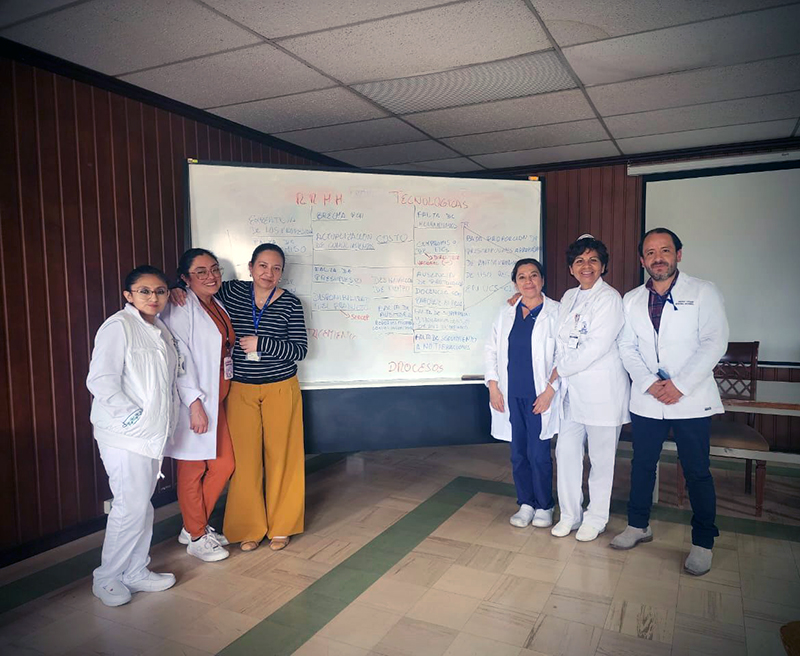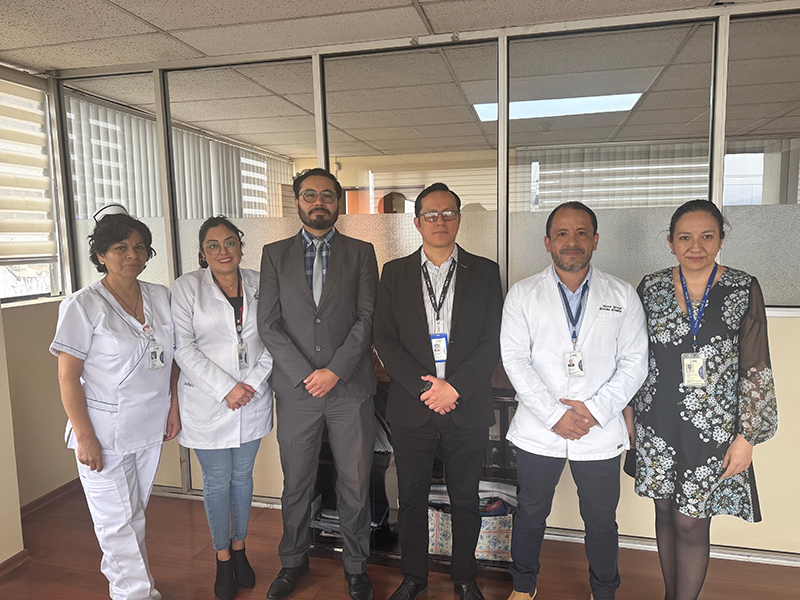Antimicrobial resistance in Latin America is an escalating public health threat, fueled by widespread antibiotic misuse and inadequate sanitation in hospitals.
In 2024, Project ECHO launched a program, called TEACH PROA*, to promote safer, more sustainable antibiotics use in low- and middle-income countries by sharing knowledge and best practices.
This year, the program** took the next step, moving from knowledge-sharing to real-world implementation. In Latin America, 22 hospitals applied what they learned through customized, on-site action plans.
“We’ve moved from sharing knowledge broadly to hands-on implementation at each site,” says Rodolfo Quirós, program coordinator for TEACH PROA. “First, spread best practices, then help each team put those practices to work in their own hospital.”
Culture Change Leading to Better Patient Care
In Ecuador, this shift has already produced measurable results. At Hospital General Riobamba IESS, the team identified contaminated blood cultures as their critical issue, a problem that can delay treatment and put patients at risk.

The hospital introduced standardized blood culture kits, trained staff across departments, and set up a monitoring system. The process also changed how the hospital works: doctors, nurses, pharmacists and lab staff now meet regularly to solve problems together, breaking down long-standing silos.
“It’s not just about cleaner blood cultures,” says Mónica Moreno, a microbiologist at the hospital. “It’s about changing how we work together to improve patient care.”
Beyond reducing contamination, the team is seeing broader gains. “This program has helped reduce surgical site infections and raised awareness across the hospital,” says Elisa Curay, a nurse in the quality and patient safety unit.
“Staff who had never heard of antimicrobial stewardship are now talking about it, and that culture shift is making a noticeable difference,” says Curay.
“Through TEACH PROA, we’ve learned that every problem requires persistence, follow-up and clear strategies,” adds Dr. Sandra Gómez, physician, quality and patient safety unit. “Seeing our efforts reflected in real results, including achieving 98% compliance in antibiotic prophylaxis, isn’t just about hitting a number. It’s about patient safety and knowing that when we are patients, we’ll receive the best care.”

The PROA team collaborating on quality improvement strategies to strengthen antimicrobial stewardship efforts at Hospital General Riobamba IESS in Ecuador. Photo Credit: Dr. Héctor Ortega
Action-Oriented Learning
Across Latin America, hospitals are piloting their own antimicrobial stewardship projects, from refining surgical infection protocols to updating antibiotic guidelines.
At Hospital Dr. César Milstein in Buenos Aires, Dr. Mariquena Ruiz noticed an immediate impact: “We’ve been to many trainings where we didn’t learn anything new or couldn’t apply it. This time, I walked away knowing exactly what to do – and we did it.”
Likewise, Malena Rivera, a nurse on the Riobamba team, found that learning from her peers in other countries “reinvigorated our own work.”
From Regional Reach to Local Impact
By helping local teams turn knowledge into action, the ECHO Model is transforming hospital practices and building a network of champions against antimicrobial resistance. The outcome: safer antibiotic use, better patient care, and a culture of collaboration that will outlast any single project.
Learn more about Project ECHO’s antimicrobial stewardship programs, or email the TEACH PROA program team in Latin America.
*TEACH PROA stands for “Programas Para Optimizar del uso de Antimicrobianos” or Programs to Optimize the Use of Antimicrobials. The TEACH PROA ECHO Program was developed in collaboration with Pfizer.
**The implementation arm of the program is called “ECHO IMPROVE” which stands for Improving “PROAs” Via Expert Support.
Featured image caption: Hospital stewardship team and leadership stand together as they launch their on-site action plan under the TEACH PROA and ECHO IMPROVE initiative. Photo Credit: Dr. Héctor Ortega

